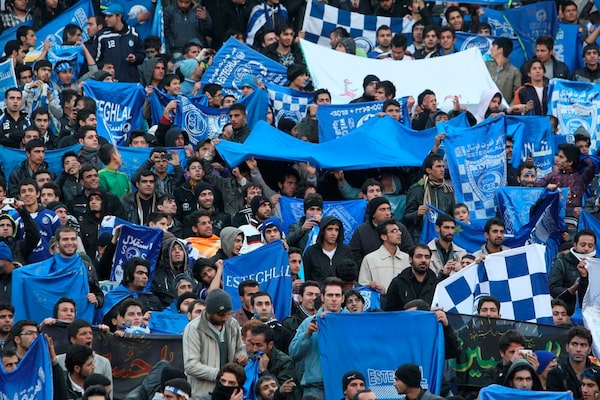
Supporters of soccer team Esteghlal FC hold flags of the team at Azadi Stadium in Tehran on Dec. 9, 2011. Esteghlal fan Sahar Khodayari’s suicide is a gruesome reminder that men at the helm of sports federations are complicit in the deliberate exclusion of women in sport.The Associated Press
Shireen Ahmed is a sports writer and co-host of the Burn It All Down podcast.
Sahar Khodayari died last week for loving a sport that excluded her. Known across the world as the Blue Girl, she was given this name because of the shade of azure she painted on her face to support her beloved soccer team, Esteghlal FC. She sustained severe injuries after lighting herself on fire, in frustration and in despair, after being sentenced to prison. Her crime? She snuck into a soccer match.
Her horrific death is a result of systemic discrimination in Iran, misogyny that permeates both sport and religion, the pillars of Iranian culture.
Ms. Khodayari died because she wanted to watch soccer. Beyond the discrimination inherent in her own country, Ms. Khodayari’s death is a gruesome reminder that men at the helm of sports federations are complicit in the deliberate exclusion of women in sport.
They hold the power to stop injustice and they do not act. There have only been lukewarm and non-committal statements from FIFA, soccer’s global governing body, regarding this issue over the years. There has been no significant effort from any major sports federation (FIFA, or volleyball and basketball’s counterparts) to boycott events or games.
Imagine this scene: FIFA president Gianni Infantino watches the widely anticipated Tehran derby, a match between the two most popular clubs in one of the city’s most anticipated events. Mr. Infantino enjoys his view from President Hassan Rouhani’s box in Azadi Stadium. He watches intently as the stadium buzzes with excitement; meanwhile more than 35 women and girls – dressed as men and boys – are detained by police for attempting to enter. This actually happened, and the year was not some bygone era, but 2018.
Azadi, ironically, means freedom in Persian.
Generations of fans have been raised to support their clubs – to immerse themselves in this dedication. But female fans have not had the ability to attend matches of any sport in stadiums in Iran since the revolution in 1979. This law was put into place and justified as a form of protection of women against lewdness of male athletes in shorts and the potential violent atmosphere of stadiums. It was also enacted to prevent women from being a distraction for men.
This deliberate exclusion was put into place and rigidly held by a theocratic state. It’s worth noting that this is no longer a practice in any other Muslim-majority country in the world. (Even Saudi Arabia began to permit women into stadiums in early 2018.)
If self-immolation is a better alternative to facing a court that penalizes someone for wanting to watch a football match, what does that say about the value of women in sport and beyond? Both Amnesty International and Human Rights Watch have called on the major sport federations to permanently end the ban against women. Yet, soccer federations remain largely quiet.
This past summer, the world witnessed a formidable Women’s World Cup, peppered with incredible players engaged in the universal game. The stands in host country France were filled with joyous and happy fans. How could Ms. Khodayari not see this and wonder why they were so brutally isolated from the game that gives them joy and so rejected by an international governing body that should have offered them protection?
FIFA and the AFC (Asian Football Confederation), under which Iran’s soccer federation is placed, have specific provisions in their statutes regarding gender equality and state that, “Discrimination of any kind … is strictly prohibited and punishable by suspension or expulsion.” The Iranian federation allows gender discrimination and it’s deplorable that FIFA and the AFC still hold sanctioned matches in Iran.
Men’s teams and players have made public statements about the death of Ms. Khodayari and the effects it has on the beautiful game, but it is the men in charge of sports federations that have the power to suspend Iran until it stops violating basic human rights.
FIFA has released the following statement: “FIFA refutes any suggestion it has been inactive in the fight for these women's rights in Iran. We are working with the Iranian Football Association in the hope and expectation that women will be in attendance at future games beginning with the FIFA World Cup qualifiers in October.”
Inactive is a generous word. They have been reckless while the voices of those women have gone intentionally unheard. Ms. Khodayari’s death was horrific, but it was not shocking. Systems of misogyny appear through patriarchal interpretations of religion in Iran and also through inefficiency of the governing of sport.
Women have been putting their bodies on the front line to fight this injustice; they have also been on hunger strikes after being detained and they will continue to do so until they are allowed to sit freely and enjoy the game they love. In the meantime. I hope no other women die in the fight for football.
Keep your Opinions sharp and informed. Get the Opinion newsletter. Sign up today.